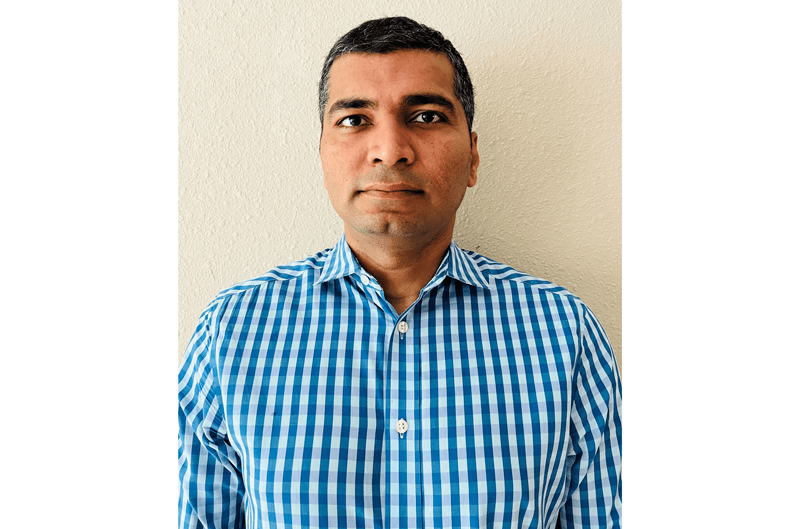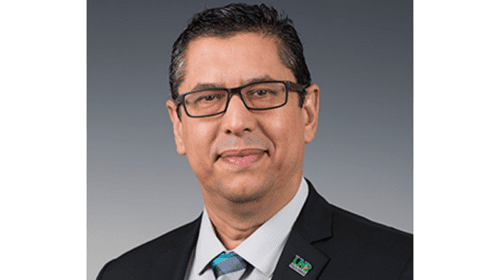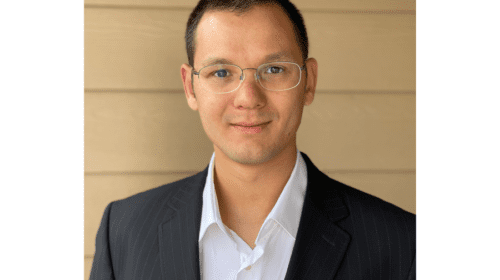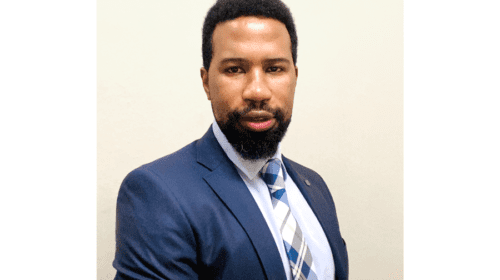Alan Alexeyev: Tell us a little bit about your current position and what you do, as well as how you found a job.
Abhishek Raj: I am a geophysicist and currently a project manager direct for one of the world’s largest oilfield services (OFS) companies, based in Houston, Texas. In this role, I lead a team of geophysicists in developing innovative seismic imaging projects in North America. I also collaborate with global research and engineering teams to develop new time-lapse seismic products, and design and develop new products for reservoir characterization workflows. Since joining this company in 2008, I have held various technical and supervisory seismic engineering positions, advancing my level of responsibility worldwide, and worked with many of the world’s biggest oil and gas operators and producers.
I received a bachelor’s degree and an Integrated Master of Science degree in Exploration Geophysics from the Indian Institute of Technology, Kharagpur (IIT), and am presently completing an M.B.A degree program at The Wharton School at The University of Pennsylvania.
Before leaving IIT, I was one of five students out of 64 to be hired by my company for the role of field seismic engineer, working in the U.S., South America and Portugal. After three years, I was promoted to chief field geophysicist in Saudi Arabia, where I deployed a novel seismic solution for reservoir characterization. Through subsequent promotions and professional development in Houston, London (U.K.) and Russia, I advanced to my present position. I am proud to be a member of the Society of Exploration Geophysicists (SEG) and the European Association of Geoscientists and Engineers (EAGE).
AA: What inspired you to start a career in the oil and gas industry? How did you decide to become a geophysicist?
AR: Since my school days, I have held a deep affinity for mathematics and physics. The allure of geophysics, which seamlessly blends both disciplines, led me to select it as my major. Throughout my time at IIT, I delved into the fascinating realm of seismic waves through my research endeavors. However, my focus always remained on the practical application of this knowledge within the context of oil and gas exploration. It was this convergence of technical expertise and real-world impact that solidified my decision to pursue a career in this field.
Eager to expand my horizons and bolster my understanding of the industry, I embarked on an internship during my college years. This invaluable opportunity allowed me to immerse myself in the day-to-day operations and distinctive culture of the sector. I found immense gratification in being a part of a process-driven industry that thrives on innovation through collaboration and teamwork. The experience enriched my perspective and reaffirmed my deep-rooted passion for translating the concepts and principles I had studied into practical applications.
With each passing experience and encounter, my conviction to forge a long-term career in the oil and gas industry grew stronger. I realized that the industry not only aligned with my academic interests, but also provided a platform for me to make a tangible impact. Armed with the knowledge and technical prowess I had gained during my college years, I felt a sense of purpose and direction in pursuing a professional path within this dynamic sector.
AA: You often meet workers in industry who do not have a formal college degree, but in your case how valuable was it to get the university experience?
AR: My university experience was tremendously valuable in launching my career. During the second year of my bachelor’s degree program, I became involved in geophysical research related to seismic waves. This enabled me to gain wider experience under a professor who later became my master’s thesis adviser. In my last two years of university, I led a small team of students in executing the proposed research, and worked on developing several algorithms related to the computation of seismic wave amplitude. I published two research papers as a main author and six publications as a co-author during my five years of academic life, a rare achievement for any university student. Despite the demands of my research, I continued to excel academically and won the Best Thesis Award in my graduation year. Working on several fronts simultaneously in university, I gained valuable time management skills, which I still use every day in my personal and professional life.
This position provided me with immense experience in OFS, especially in seismic acquisition operations. I worked in the field on several seismic vessels in different regions including South America, North America, Europe and the Middle East. In less than three years, I was promoted to chief field geophysicist to lead the onboard processing team on a seismic vessel. My role required me to work with clients on deliverables, and to manage the project efficiently to meet timelines and budgets. The knowledge and skills that I learned in university, along with the experience I gained from opportunities that were available to me through my academic career, helped me succeed in this role.
AA: How did you find yourself transitioning from the academic environment to the industry/corporate? What would you tell people who are about to make such a transition?
AR: I believe that the research and implementation opportunities that I pursued during my academic career helped me transition smoothly to the corporate environment. It’s important to realize that each step is a building block. The experience I obtained from my first leadership role in seismic field operations, successfully implementing the latest seismic acquisition technology in Saudi Arabia, propelled me to pursue gaining knowledge for every part of the oil and gas revenue generating business. To understand how different parts of the business are structured, I first took a role in a commercialization group, in which I worked with a research and development team in the United Kingdom on bringing a next-generation seismic system to market. As a commercialization staff geophysicist, I helped the team develop workflows required for using different components of the system and created technical and marketing content to differentiate the system in the marketplace. This experience gave me the opportunity to play a key role in the successful launch of this new technology, and in just six months in this role, I was chosen by a leadership team to attend an elite 14-month area geophysicist course in Houston. Learning from industry leaders and internal and external subject matter experts advanced my technical abilities and business acumen, as well as my problem-solving skills.
My advice to people making the academic to corporate transition would be never stop learning. The way to build a career in oil and gas is to develop and expand your skill set. Don’t be afraid to venture outside of your technical comfort zone. Leadership is also a learned skill that you must have to advance your career. Only a few people are “born leaders.” Most achieve [success] in leadership roles by practicing their listening and communication skills, respecting diversity in their colleagues and cultural interactions, and modeling behaviors observed in their mentors and managers. Even people who think they are not natural leaders can be successful, but it takes initiative and effort to pursue professional development in this area.
AA: Has the industry taken initiatives to smoothly transition young professionals into the oil sector? What, if anything, could be done better?
AR: Our industry is currently undergoing a significant transition. The traditional oil and gas sector is now evolving into an energy provider sector. In order to successfully embrace this change, the oil and gas industry must make investments not only in research and development but also in human capital. It is crucial for companies to recognize the importance of sustainability and clean energy as central elements of their agenda. By doing so, they can expand their operations and create a demand for young professionals who are well-versed in these areas. This industry-wide transformation has brought about a wide array of career opportunities, catering to diverse skill sets and interests. However, to fully capitalize on this potential, it is imperative that the industry proactively educates and informs young professionals about the new offerings and avenues available within the sector. By raising awareness about the evolving landscape and the exciting prospects it holds, the industry can attract talented individuals who are passionate about making a difference in the energy sector.
AA: The oil and gas industry has numerous conferences and events. Have you attended any of them? If so, how useful do you find them and what’s your takeaway from them?
AR: I have had the honor of presenting my research results and several successful case studies of seismic projects at various conferences, including the 2015 Madrid EAGE Conference, the 2016 Vienna EAGE Conference, and the 2017 Houston SEG Conference. Additionally, I have attended numerous industry conferences and events, which I find highly beneficial. These platforms allow for sharing knowledge with the largest geophysical technical community and provide an opportunity to learn from other industry players. In addition to the technical and research aspects, these conferences offer an excellent overview of the industry’s future direction. Presentations from different companies regarding their research and products provide valuable insights into addressing industry challenges related to hydrocarbon extraction. Moreover, the product launches during these conferences offer a basis for conducting SWAT analysis on competitors, helping individuals define or refine their technical strategies for achieving success. Lastly, these conferences provide young professionals with an opportunity to explore various technological domains in which they can venture for their careers.
AA: If you communicate with students on a regular basis, do you think there’s an increased or decreased interest among young people to have a career in the oil and gas industry in comparison to the past?
AR: In light of the prevailing trends surrounding clean energy, sustainability, and climate change, there has been a slight reduction in the interest among young individuals towards the traditional core oil and gas segment. However, it is important to note that there is a significant demand and ample opportunities for a career in the digital-driven operations of the oil and gas industry. A career in the oil field offers a unique lifestyle that sets it apart from many other professions. Working in this field entails collaborating with diverse teams comprising individuals from various backgrounds and areas of expertise. Additionally, the nature of the industry often involves venturing to remote and extraordinary locations across the globe. This aspect of exploration and travel appeals to many individuals and has been a driving force behind attracting talented professionals from around the world.
Despite the changing landscape of the industry, the emergence of new technologies such as artificial intelligence (AI) and machine learning has brought about a parallel segment for career development. These technological advancements have revolutionized the way operations are conducted within the oil and gas sector. From data analysis and optimization to predictive maintenance and decision-making, digital-driven approaches have transformed the industry and created exciting prospects for those with the necessary skills.
By leveraging AI, machine learning, and other digital tools, the industry has been able to enhance efficiency, productivity, and safety across various operations. As a result, there is a growing demand for professionals who possess a deep understanding of these technologies and can effectively navigate the digital landscape within the oil and gas sector. This evolving segment offers enticing career opportunities for individuals who are keen to contribute to the industry’s digital transformation and be at the forefront of technological advancements.
AA: What advice do you provide to students who have an interest in the oil and gas industry? Should they pursue a career in oil and gas during these constant downturns?
AR: Yes, certainly. The oil industry offers a diverse range of career opportunities, including technical, managerial, field-based, and office-based roles. Considering the expanding business segments, due to recent trends related to global warming, digitalization, and clean energy, there are ample growth opportunities available.
For those interested in entering this industry, I suggest diversifying their skill set. This is crucial for building resilience in any business environment. For example, if one enjoys solving technical problems, I recommend also developing skills in sales to effectively market those solutions, or collaborating with other companies to make them commercially viable. Every segment of this business presents numerous new opportunities, and individuals must carefully evaluate their personal interests, long-term career goals, market conditions, and industry trends to make informed choices.
By remaining informed, adaptable, and open to change, students can position themselves to make well-informed decisions that align with their passions, expertise and the ever-evolving energy landscape.
AA: What main technical skills do you think will be needed for the industry in the near term based on your experience so far?
AR: Technology for increasing hydrocarbon extraction is an essential aspect for the industry’s continuous growth. As existing oil and gas fields mature, it becomes increasingly challenging to extract hydrocarbons efficiently. To meet the rising global energy demand, the industry must invest in the development of new technologies that can enhance extraction rates. These advancements enable companies to optimize production from reservoirs, ensuring a smooth supply of hydrocarbons to meet energy needs. The skills required for developing such technologies are crucial for the industry’s success. Professionals with expertise in areas like reservoir engineering, drilling techniques, and production optimization play a pivotal role in designing and implementing innovative solutions. They contribute to maximizing hydrocarbon recovery, minimizing production costs, and improving operational efficiency. Additionally, knowledge of emerging technologies and industry trends is vital to stay ahead of the curve and address evolving challenges in hydrocarbon extraction.
In the realm of renewable energy, while there are numerous concepts and startups focused on generating clean energy, achieving commercial success remains limited. Technical expertise is vital to bridge the gap between concept and execution, transforming these ideas into viable energy solutions. Professionals who possess the skills to assess feasibility, design efficient systems, and optimize renewable energy processes are in high demand. This expertise helps drive the adoption of sustainable energy sources and contributes to the industry’s commitment to reducing environmental impact.
Digitalization is an area where the oil industry is poised for significant growth in the near future. With an abundance of data at their disposal, companies have the potential to unlock valuable insights and optimize operations. Technologies such as machine learning, artificial intelligence, and data analytics play a pivotal role in accelerating digital transformation. Professionals well-versed in these technologies, with the ability to analyze data, identify patterns and extract meaningful information, are essential in leveraging digitalization’s full potential. Collaborating with experts from different industries further enriches the digital landscape, fostering innovation, and the development of tailored digital solutions for the oil and gas sector.
AA: What would you like to learn from experienced people who are in their mid-to-late careers?
AR: As a mid-career technical professional looking to transition into a technical management role, I am seeking valuable insights from experienced individuals who are in their mid-to-late careers. Specifically, I would like to learn about effective leadership and management strategies, including team building, communication, decision-making and problem-solving. I also want to gain insights into motivating and inspiring teams, delegating responsibilities, and handling challenges that arise in managerial positions. Another area I am interested in developing is my understanding of change management principles and methodologies. I want to learn how to navigate organizational changes, lead teams through transitions, and effectively communicate and implement changes to achieve desired outcomes.
Additionally, I am eager to acquire knowledge about emerging areas, such as renewable energy, digital transformation, automation and others, that will help me stay ahead of the curve and identify potential growth opportunities. Building relationships with experienced professionals who can serve as mentors or advisors is also a priority for me. I actively seek opportunities to learn from their experiences, gain insights into their career paths, and receive guidance to navigate my own professional journey. Pursuing an MBA from Wharton is one of the steps I have taken to expand my network and learn from industry leaders.
Alan is a graduate from the University of North Dakota with a Master's degree in Petroleum Engineering. He previously earned his BA in Mathematics from the University of Houston and a BS in Petroleum Engineering from the University of Wyoming. Alan is an active SPE member and has presented at petroleum conferences and exhibitions.
Oil and gas operations are commonly found in remote locations far from company headquarters. Now, it's possible to monitor pump operations, collate and analyze seismic data, and track employees around the world from almost anywhere. Whether employees are in the office or in the field, the internet and related applications enable a greater multidirectional flow of information – and control – than ever before.












